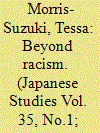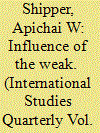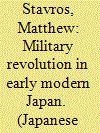|
|
|
Sort Order |
|
|
|
Items / Page
|
|
|
|
|
|
|
| Srl | Item |
| 1 |
ID:
140346


|
|
|
|
|
| Summary/Abstract |
The special issue ‘Rethinking Race and Racism from Japanese Experiences’ explores how racism operates in modern Japan. This article contributes to that exploration by examining how racism is situated within a nexus of interrelated forms of discrimination and marginalization. In the article I propose the notion of ‘semi-citizenship’ as one framework which can help us to go beyond unfruitful zero-sum-game visions of marginalization put forward by racist groups such as the Zaitokukai in Japan. Rather than envisioning a dichotomous contrast between ‘citizen’ and ‘non-citizen’, the idea of semi-citizenship allows us to think of a range of different sets of social positions stretching towards the idealized vision of the ‘full citizen’. We can then start to consider how such social positions are distributed within modern societies, how they are influenced by factors such as ethnicity, gender and physical and mental attributes, and how the distribution changes over time. This approach offers a common ground on which various kinds of marginalization may be related and understood together, potentially providing a basis for collaborative work to create a more equitable Japanese society.
|
|
|
|
|
|
|
|
|
|
|
|
|
|
|
|
| 2 |
ID:
156976


|
|
|
|
|
| Summary/Abstract |
In 1893, Sumiya Koume (1850–1920) wrote an essay for the prominent women’s journal Jogaku zasshi (Women’s Education Magazine) entitled ‘I Recommend Against Becoming a Geisha or Concubine’. In it, she critiqued both roles and exhorted women who were serving as geisha not to become concubines. She did not mention that she herself had worked as both a geisha and a concubine (tekake or mekake). By the time she wrote her essay, she had also served as a political activist as well as a social reformer and missionary. Sumiya’s life sheds light on the transitional nature of the early Meiji era, specifically the period of flux between the formal abolition of concubinage in 1882 and the advent of the state-sponsored ‘good wife, wise mother’ (ryōsai kenbo) paradigm in 1899.
|
|
|
|
|
|
|
|
|
|
|
|
|
|
|
|
| 3 |
ID:
193622


|
|
|
|
|
| Summary/Abstract |
Following victory in the Russo-Japanese War, the Meiji government sought to expand its maritime influence in Northeast Asia by developing pelagic fisheries in the newly acquired Kwantung leased territory, but it encountered immediate resistance from the Qing court, which had just embarked upon ambitious reform to strengthen maritime defence through the building of a national fishing industry. The dispute first emerged as a clash between Japanese and Chinese fishery protection companies on the seas adjacent to the Chinese city of Xiongyue. It then gave rise to a protracted Sino-Japanese legal debate on the question of whether the Xiongyue fishing ground was in the free sea or part of Chinese territorial waters. However, the 1912 settlement agreement made no mention of the legal status of the fishing ground. By examining this oft-neglected dispute, this article not only provides a rare East Asian case that illustrates the tension between the requirements of national sea borders and the principle of navigational freedom, but also explores how the Meiji and Qing governments perceived and practised international maritime law at the turn of the twentieth century. It argues that neither government viewed international maritime law as the only referential framework to solve the dispute, especially when it contributed little to the conflict settlement and contradicted their perceptions of the historical relations between East Asian countries.
|
|
|
|
|
|
|
|
|
|
|
|
|
|
|
|
| 4 |
ID:
088119


|
|
|
|
|
| Publication |
2009.
|
| Summary/Abstract |
During the late 1910s to early 1920s leaders in women's education sought to rationalize and modernize daily life through the promotion of 'domestic science'. Their writings, aimed at young educated middle class women, focused on ways to reform the running of their households to fit their changing roles as modern women and the changing conditions of Japanese society more generally. They assumed the sexual division of labour, but as reformers, they envisioned that middle class women would play a key role as household managers in the 'new era'. Following their instructions for efficient, scientific management of clothing, food and housing would ensure young women's social standing as exemplary middle class housewives, to the benefit of themselves personally as well as their families and the nation.
|
|
|
|
|
|
|
|
|
|
|
|
|
|
|
|
| 5 |
ID:
118171


|
|
|
|
|
| Publication |
2012.
|
| Summary/Abstract |
Political life in modern Japan, South Korea, and Taiwan is commonly characterized by a strong central government, influential economic elites, and a relatively homogeneous society. In such settings, we would not expect to find much impact by foreigners and small NGO actors on policy changes, but the cases in these countries challenge this assessment. Relatively unskilled foreign workers in present-day Northeast Asia face a range of hardships, and existing government programs have provided little support until recently. Media portrayals of foreign workers-as in several other industrialized democracies-reinforce popular suspicions and fear of these foreigners. Yet, citizens of host countries themselves have formed numerous voluntary associations aimed at assisting foreign workers. I call the activities of these groups "associative activism." My account of associative activism makes explicit the process through which some activists, who initially work in concert chiefly to solve specific problems, eventually form broader political ambitions as they exert pressure on dominant features of the public sphere, especially processes of governance, political representation, and opinion formation. I identify three domains of associative activism through which political influence is exerted by immigrant rights groups: legislative, juridical, and municipal. These efforts illustrate how civil society groups can play an increasing role in protecting foreigners' rights and advancing democratization in Northeast Asia.
|
|
|
|
|
|
|
|
|
|
|
|
|
|
|
|
| 6 |
ID:
087709


|
|
|
|
|
| Publication |
New York, Frederick A Praeger, 1967.
|
| Description |
110p.
|
|
|
|
|
|
|
|
|
|
|
|
Copies: C:1/I:0,R:0,Q:0
Circulation
| Accession# | Call# | Current Location | Status | Policy | Location |
| 000653 | 338.952/YOS 000653 | Main | On Shelf | General | |
|
|
|
|
| 7 |
ID:
116286


|
|
|
|
|
| Publication |
2012.
|
| Summary/Abstract |
This article deals with the commercial aspect of midwifery in Japan since the Meiji period. In focusing on the important yet often neglected aspect of the history of medically trained midwives, it aims to complement existing scholarship that tends to emphasize the role of midwives in the construction of the modern Japanese state. The article analyzes and contextualizes health-related advertisements published in San'iku shimbun, a newspaper aimed at medically trained midwives. These advertisements encouraged midwives to participate in commercial activities involving the sale and promotion of health commodities. Representations of midwives in the advertisements point towards an important aspect in the professional reality of midwifery: making a living. But the advertisers also implicitly exploited the role ascribed to midwives, as agents of health and hygiene in the context of the modernizing state. Thus the social function of medically trained midwives was informed both by their officially endorsed role in the state's vision of creating healthy citizens and the reality of their position in the medical marketplace.
|
|
|
|
|
|
|
|
|
|
|
|
|
|
|
|
| 8 |
ID:
124530


|
|
|
|
|
| Publication |
2013.
|
| Summary/Abstract |
Military changes that took place in Japan during the late sixteenth century bear a striking resemblance to those in Europe at about the same time. This essay argues that the Roberts thesis of military revolution - widely applied to Europe - provides a useful framework for identifying a series of cascading developments that, once realized, constituted the fundamental elements of a similar revolution in early modern Japan. These included: the almost universal adoption of firearms, the development of tactics for the effective deployment of those firearms, and finally, a change in the composition and organization of armies leading to the professionalization of warfare. Most important, by revolutionizing the way armies were organized and wars were fought, Oda Nobunaga and Toyotomi Hideyoshi contributed directly to the emergence of new notions of centralized authority that were critical to the creation of a unified and peaceful early modern state.
|
|
|
|
|
|
|
|
|
|
|
|
|
|
|
|
| 9 |
ID:
067300


|
|
|
|
|
|
|
|